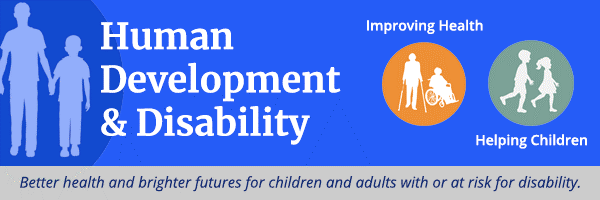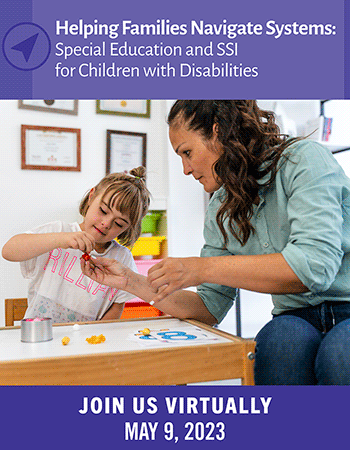DHDD Newsletter – April 2023

A Note from the DHDD Director
Dear DHDD Partners,
Instinctively, I put a lot of thought into how we can focus our work to drive meaningful and sustainable change. Sustainability is key to lasting change for the populations we serve, particularly in the face of limited resources. This requires identifying what is already working as well as how we can make our work even stronger and more impactful and sustainable over time.

An example of this type of work is a recent publication from our team focused on early childhood and education (ECE) quality rating and improvement systems (QRIS) indicators. The publication highlights a review of evidence-informed quality indicators for ECE programs and mental health promotion in 41 states. Findings indicate that more detailed QRIS indicators can inform quality improvement and capacity-building for ECE providers at state and local levels. Using this information for policy and practice changes could make a difference in the lives of millions of children over time.
I’m also excited to highlight the new funding awards for the expansion of the Autism and Developmental Disabilities Monitoring (ADDM) Network, through the Consolidated Appropriations Act, 2023. This expansion helps us to establish the infrastructure needed for even greater ASD surveillance and allows us to provide data that partners can use to inform their strategies, policies, and programs in more communities. This is yet another opportunity to make an impact for sustainable change. The more we can learn about people with ASD, the greater our ability to help support our partners in providing life-changing services and supports.
I continue to be proud of our work every day. I look forward to working with you as vital partners in leveraging our collective efforts to create sustainable, lasting change for people with, and at risk for, disabilities. Thank you for all you do.
Sincerely,
Karyl
Karyl Rattay, MD, MS, FAAP
DHDD Director
In the Spotlight
CDC Announces Expansion of the ADDM Network

CDC has announced new funding awards for the Autism and Developmental Disabilities Monitoring (ADDM) Network, the only collaborative network to track the number and characteristics of children with autism spectrum disorder (ASD) and other developmental disabilities in multiple communities throughout the United States. The new funding supports expansion of the ADDM Network through the Consolidated Appropriations Act, 2023.
CDC’s ADDM Network expansion updates include
- The ADDM Network has expanded from 11 sites to 16 sites
- Newly awarded ADDM sites include Arizona, Indiana, Pennsylvania, Texas (Austin) and Texas (Laredo)
- All 16 ADDM sites will track ASD among 4- and 8-year-old children
- Nine ADDM sites will now also track transition planning and co-occurring conditions among 16-year-old children with ASD; this is an increase from five sites
For more information, please visit this CDC ADDM web page.
Tools and Resources
DHDD Recognizes Autism Acceptance Month with Autism Research and Resources

In recognition of Autism Acceptance Month, DHDD released several publications based on the latest Autism Developmental and Disabilities Monitoring Network (ADDM) data and other research and resources. The recently released ADDM Network report indicates that about 1 in 36 8-year-old children living in ADDM Network sties were identified with autism spectrum disorder (ASD) in 2020. Findings also indicate that early ASD identification was disrupted following the start of the COVID-19 pandemic. Additional details are available, including a new pattern in racial and ethnic differences in ASD identification among 7-year-old children, in a special web feature.
DHDD also participated in the Interagency Autism Coordinating Committee (IACC) meeting on April 4, 2023, to present key findings from the latest ADDM data and share how the results can inform services and supports for people with ASD. A recording of the meeting, including DHDD’s presentation on 2020 ADDM data, can be found on the IACC website.
AAP Webinar on Navigating Systems of Care Offers Continuing Medical Education Credit

The American Academy of Pediatricians, with support from CDC, will host a webinar titled “Helping Families Navigate Systems: Special Education and SSI for Children with Disabilities.” This live virtual event will provide pediatric clinicians with the practical tips, knowledge, and resources to navigate systems of care to support families/caregivers of children who were recently identified with a delay or disability. Learners will understand the role of pediatric clinicians in helping families/caregivers apply for Supplemental Security Income (SSI) benefits and navigate the special education system, including Individualized Education Programs (IEPs) and Section 504 plans. This activity has been approved for AMA PRA Category 1 Credit™.
Register now for this live event on Tuesday, May 9, 2023, from 11:30am – 12:30pm Central Time.
ASTHO Blog Highlights Disability Inclusion in Emergency Planning
In a new blog, Association of State and Territorial Health Officials (ASTHO) emphasizes the importance of inclusive practices that prioritize the safety and well-being of all residents, including people with disabilities, in ensuring effective disaster and response. ASTHO describes how community organizations and state agencies worked with the National Guard and other emergency response teams to protect the health of residents in Rhode Island during Winter Storm Harper in January 2019. The blog includes strategies and actions that can be used to promote accessible preparedness in communities throughout the United States.
Publications
Applying the Lancet Commission’s Profound Autism Definition to ADDM Network Data
In 2021, the Lancet Commission met to address the current needs of individuals with autism and their families worldwide. Following a panel discussion, the Commission proposed that the autism community begin using the term profound autism to help identify and support children and adults with autism spectrum disorder (ASD) who are most likely to have the greatest lifetime needs for supports and services based on the presence of co-occurring conditions, such as intellectual disability or being non-verbal.
CDC’s Autism and Developmental Disabilities Monitoring (ADDM) Network has tracked the number and characteristics of young children with ASD across multiple diverse communities in the United States for over 20 years. CDC has released a report in Public Health Reports assessing the number of 8-year-old children in the ADDM Network from 2000–2016 who met the Lancet Commission’s profound autism definition and how they compared to 8-year-old children with autism who did not meet the definition over this period. Key findings include:
- Approximately 27% of 8-year-old children with autism met the Lancet Commission’s definition of profound autism during the 2000–2016 surveillance years.
- In 2016, the population prevalence of profound autism was more common in children who were identified as being from racial and ethnic minority groups compared to children who were identified as being non-Hispanic White. Population prevalence of non-profound autism was higher in non-Hispanic White children compared to children from racial and ethnic minority groups.
- From 2000 – 2016, both profound and non-profound autism population prevalence increased over time, but the increase in prevalence was greatest for the non-profound autism group.
Read the journal article to learn more about the findings.
Review of Quality Indicators for Early Care and Education Programs

A new CDC study reviewed evidence-informed quality indicators for early care and education programs in 41 states. The study compared each state’s use of quality rating and improvement systems (QRIS) indicators for early care and education with national, evidence-informed quality standards relevant to early childhood development and mental health promotion. Findings show that opportunities exist to enhance and expand indicators within states. QRIS indicators can help promote early childhood development and mental health standards in early care and education systems.
Read the journal article to learn more about the study findings.
Partner News and Announcements
Reminder: COVID-19 Public Health Emergency Expires May 11, 2023
The Public Health Emergency (PHE) for COVID-19 is expected to expire at the end of the day on May 11, 2023. The PHE action means that the US federal government will transition from the emergency phase of the COVID-19 response, but CDC’s commitment to equitable health outcomes will continue. CDC remains dedicated to preventing severe illness and death from COVID-19, particularly for populations at higher risk such as some people with disabilities and individuals who are immunocompromised. CDC will continue working with other federal government agencies and offices to maintain equitable access to vaccines, testing, and therapeutics to the extent possible.
For additional details on the PHE expiration, please check out this Department of Health and Human Services fact sheet.

